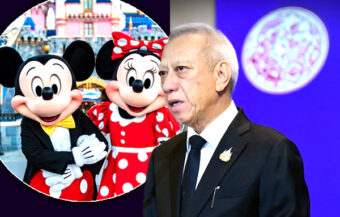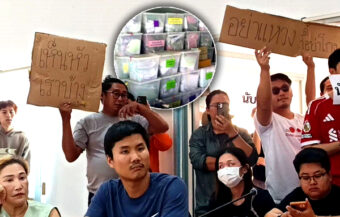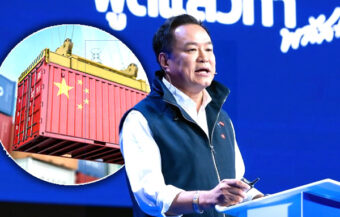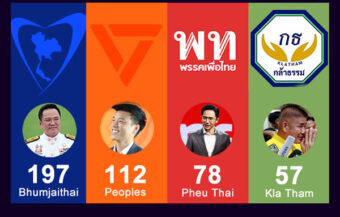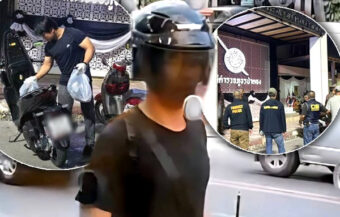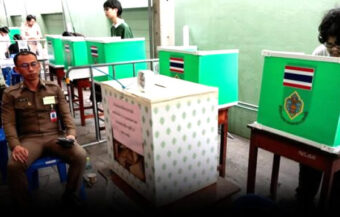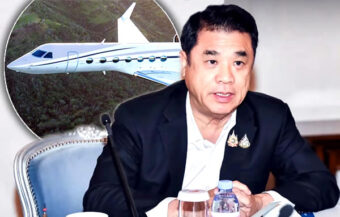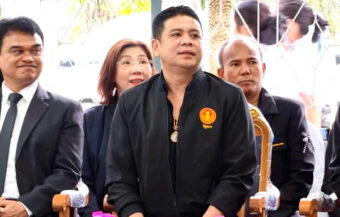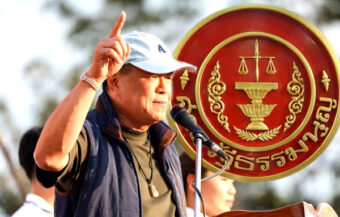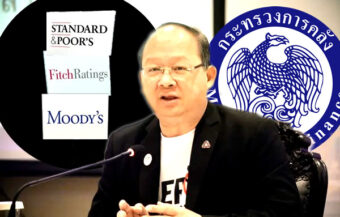Thailand’s trade talks with the United States are suspended, leaving businesses alarmed, exports at risk, U.S. investment threatened and the country facing increased dependence on China if urgent action on the Peace Pact is not taken immediately.
Business leaders in Bangkok are growing alarmed after Thailand’s trade negotiations with the United States were suspended on Friday. They flatly reject government claims that talks are still continuing and warn that the deal secured on August 1st could be lost for good without immediate action. Executives say the pause comes just as Washington had become more open to improved terms. Now, unless the situation shifts fast, Thailand risks being shut out of its key export market, losing further U.S. investment and watching Western confidence evaporate. The country faces sliding into dependence on China while a U.S.-led free-market bloc moves ahead without it. Notably, Washington’s stance may also fuel renewed doubts about Thailand’s bona fides across other Western capitals, including the European Union.

The Thai business sector has been left in trepidation since Friday night over the suspension of trade talks with the United States. The situation has not been resolved, and, if anything, the risks of a real breach and further negative developments are rising.
It comes as the Thai Prime Minister and his government appeared to be in complete denial regarding the letter sent on Friday night from the Office of the United States Trade Representative. Notably, this communication has not been reported as withdrawn.
Since the weekend, Thai officials have repeated that trade and the Thai-Cambodian conflict are separate issues. They have delivered this line in every briefing. The message has been consistent and firm. Yet the pressure has not eased. Instead, it has intensified.
Thai officials insist trade and security are separate issues as pressure over U.S. talks continues to mount
On Friday night, Prime Minister Anutin Charnvirakul spoke by phone from China. He made the call after receiving a written notice from the Office of the United States Trade Representative.
The letter stated that the United States would halt tariff talks. It definitively linked the pause to Thailand’s public repudiation days before of the Thai-Cambodian Peace Declaration signed in Kuala Lumpur on October 26.
However, Thailand has not renewed its commitment. Key parts of the declaration remain suspended. These include the withdrawal of troops and heavy equipment from the conflict zone. Indeed, Thai officials have repeatedly confirmed this over the weekend and even on Monday.
On Saturday, the Ministry of Foreign Affairs confirmed the suspension of tariff talks. Officials said the USTR decision came despite Thailand’s insistence that security matters are separate from trade.
Government insists talks continue despite U.S. suspension and reaffirms Cambodia’s peace obligations
Nevertheless, Minister of Finance Ekniti Nitithanprapas later said talks were still moving. He cited a subsequent phone call between Anutin and U.S. President Donald Trump. That call was described inside the government as direct and forceful. During it, Anutin asked Trump to lower tariffs further.
Meanwhile, reports from Washington have contradicted Bangkok. U.S. sources confirmed the talks were postponed. They pointed to Thailand’s unilateral suspension of obligations under the peace declaration. They said the move signalled bad faith in international commitments.
At the same time, the Thai government has defended its stance. Officials have argued that Thai sovereignty is non-negotiable. They say Thailand has the right to respond to Cambodian actions without external pressure. However, this ignores a precedent which was set in July.
At that time, Trump bluntly said there would be no trade talks without a ceasefire. Washington’s message was clear. Compliance was required for negotiations. That condition now appears active again, or has always been understood by the United States.
Political and legal tensions rise as binned peace declaration raises real doubts about Thailand’s bona fides
The peace declaration had created political strain for Anutin. His nationalist approach was visible even before he became prime minister in September. Government insiders had even argued that the pact is not a binding treaty. They say the trade framework is also non-binding. However, those distinctions have not eased tensions. The uncertainty has grown instead.
Recently, Thai officials have highlighted potential legal challenges in Washington, DC to the U.S. tariff regime. They noted that the U.S. President imposed the tariffs using special powers. They said the Supreme Court might review or even throw down those powers.
Yet U.S. sources also note that the President has other legal mechanisms. They say he could bring the issue to Congress if necessary. U.S. legal experts believe the White House can rebuild the tariff order using other statutes or mechanisms. Therefore, a full or even partial reversal is unlikely.
Commerce Minister Suphajee Suthumpun is currently in the United States. She has told business groups that Thailand expects the trade deal to conclude by the end of 2025. In effect, five weeks from now. Her message contrasts sharply with growing unease in Bangkok in business circles.
Thailand risks economic and diplomatic fallout if urgent action is not taken on rejected peace pact
A sudden tariff increase by Trump cannot be ruled out. Nor can the cancellation of trade talks. Washington has asked for renewed Thai commitment to the peace pact. Thailand has obfuscated but ultimately declined. That refusal has fueled further concern.
Thai business leaders have warned of mounting risks. Chamber of Commerce chairman Poj Aramwattananon said the private sector is on alert. He said firms are monitoring the situation closely. They are waiting for clarity from Washington.
Thai National Shippers’ Council chairman Thanakorn Kasetsuwan echoed that view. Mr. Thanakorn said new tariff talks now appear unlikely. He cited the USTR’s explicit decision to pause discussions. He said delays could hurt exporters.
The private sector has identified specific risks. First, Thailand could lose access to better tariff opportunities. This would place Thai exporters at a price disadvantage. Competitors already holding trade agreements with the United States would gain the edge.
Thai exporters face loss of tariffs, competitiveness and investment as trade talks remain on hold
Second, uncertainty may disrupt investment decisions. Exporters in electronics, automotive, appliances and food could see delays. Third, Thai goods may lose competitiveness. The United States accounts for roughly 18% of Thai exports. Rivals in Vietnam and Mexico could benefit. Fourth, the United States may increase pressure on market access. This could include tighter inspections and stricter regulatory demands. Fifth, suspended talks may slow cooperation on technology, logistics and supply chains.
Thanakorn said compliance with the peace declaration could restore negotiations. He said this could allow Thailand to restructure priority tariffs. It could also expand access to the U.S. market. He said cooperation on advanced technology could deepen. Yet he warned that border politics directly affect trade stability. Prolonged delays could erode Thai market share.
The Shippers’ Council has urged immediate action. The influential body called for urgent government-to-government talks. In addition, it asked for clear updates on Thailand’s status under the declaration. It said Thailand must reassure U.S. investors.
Coordinated action urged to secure U.S. trade access and mitigate risks of suspended tariff discussions
The body certainly urged the government to support exporters with market diversification. For instance, recommended using existing FTAs, including the Regional Comprehensive Economic Partnership (RCEP). It also advised tighter monitoring of transhipment rules, labour standards and origin regulations. It called for coordinated state and private-sector responses. Thanakorn said the suspension shows how security now shapes trade decisions.
The political fallout in Bangkok has been sharp. The USTR announcement has triggered a domestic clash. The opposition Pheu Thai Party accused Anutin of provoking the situation.
The argument intensified after the prime minister’s blunt reaction to questions about tariffs. He said he no longer cared about talks. He said Thailand could sell products elsewhere.
During the recent state visit to China, Anutin provided more detail. The PM said he privately asked Trump for further tariff cuts. He said Thailand cooperates fully with Washington. Furthermore, he said Trump asked Thailand to honour the Cambodia pact to maintain U.S. credibility.
Photos released by the prime minister’s team showed Anutin and Foreign Minister Sihasak Phuangketkeow speaking with Malaysian Prime Minister Anwar Ibrahim on November 15.
Anutin’s China visit highlights U.S. talks and Cambodia pact amid rising domestic political tensions
After Washington froze the talks, Anutin said the suspension preceded his call with Trump. He also said Anwar told him the United States would not link the ceasefire to tariffs. That statement conflicted with the Foreign Ministry’s reaction.
The Ministry said the United States had linked trade and security. Spokesman Nikorndej Balankura said the issues should remain separate.
The economic stakes are substantial. Bilateral trade totalled an estimated $88.3 billion in 2024. The figure rose 13.6% from the previous year. Commerce Minister Suphajee said Thailand remains ready to negotiate.
Yet Washington’s leverage is clear. The current standoff is not new. The United States suspended tariff talks with both Thailand and Cambodia after a five-day border war in July. Trump described the move as diplomatic leverage. He said the tariff threat helped stop fighting.
Economic stakes remain high as bilateral trade grows and U.S. leverage continues amid on-hold talks
Domestic tensions have deepened. Analysts say Anutin is trying to maintain nationalist support. The prime minister drew conservative criticism after saying both sides caused border clashes.
His suspension of the peace pact came after a Thai soldier lost a leg to a landmine. Thai officials believe the mine was newly laid by Cambodian forces.
Former assistant foreign minister Russ Chalijandra said Anutin’s comments revealed inexperience. Pheu Thai spokesman Suksit Sreejomkhwan said Anutin’s shifting messages damaged Thailand’s credibility.
The People’s Party has remained silent. Its lawmakers backed Anutin’s rise through a four-month pact. That pact focused on constitutional changes. The escalating dispute now goes far beyond that agenda.
Thailand has not recommitted to the peace declaration. Washington has paused tariff talks until it does. Bangkok says the issues must remain separate. Washington says they are linked.
Political credibility and governance questioned as ongoing Cambodia dispute affects Thailand’s reputation
Thai businesses face rising uncertainty. Only one economic bright spot remained this year: stable access to the U.S. market. That prospect is now in jeopardy. The tariff talks are suspended. The risk of full cancellation is real. Exporters are watching closely as pressure increases on both sides.
Undeniably, Thailand has a weaker hand. A negative development could land on Prime Minister Anutin’s desk at any minute. The repercussion will be felt not only in terms of exports and trade but also U.S. investment. Indeed, a wrong turn in this test of wills could leave Thailand on the wrong tracks geopolitically. Presently, the world is being divided between pro-China and pro-America spheres of influence.
Cambodia factor which came from nowhere in June suddenly threatens both Thai politics and its economy
Prime Minister Anutin signs accord with Cambodia witnessed by US President Trump in Kuala Lumpur
Anutin faces stiff foreign policy test over October 10 deadline and President Trump’s demands for peace
China’s long-term hold on Thailand over the last two decades has not been wholly beneficial. From Chinese mafia scam centres to cheaper zero-dollar investments, the deterioration in the kingdom’s economy has been noticeable. The overvalued Thai baht can also be linked to the country’s invisible and hidden links with China.
Unless this situation is recovered by urgent action from the Thai government, the country stands to lose big time. Meanwhile, there are many other Southeast Asian economies and countries ready to take up the slack, such as the Philippines, Vietnam, Indonesia and Malaysia.
Join the Thai News forum, follow Thai Examiner on Facebook here
Receive all our stories as they come out on Telegram here
Follow Thai Examiner here
Further reading:
Trump brokered peace pact between Thailand and Cambodia suspended after landmine attack this week
Prime Minister Anutin signs accord with Cambodia witnessed by US President Trump in Kuala Lumpur
Trump to oversee ground breaking new deal between Thailand and Cambodia on Saturday to map border
High powered, secretive meeting chaired by PM agrees robust action against Cambodian networks
Thailand and Cambodia face danger from ‘Dragon Head’ the Chinese mafia leader behind the scams

